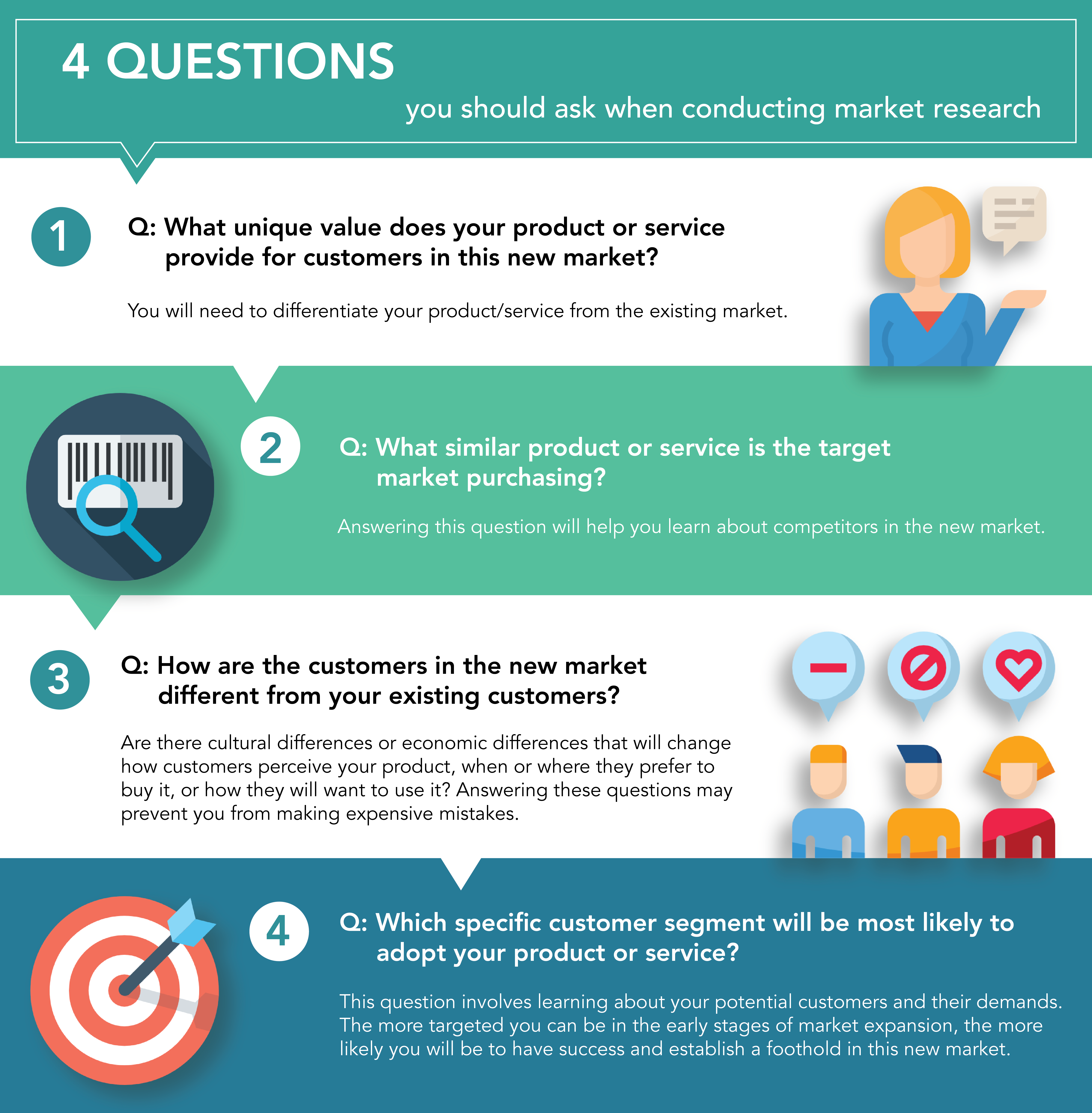Market Access and Exports

Do you want to develop your business internationally? Learning about market access and exporting will help you grow sustainably, and enhance your competitive edge.
The Philippines Department of Trade and Industry (DTI) has posted relevant policy documents online.
Market Research
Should your business provide a new product or service to your existing customers? Or should you aim to enter a new market and find new customers? Market research will help you find the answers and make good decisions.
Market Research Questions

Globaltrade.net provides a listing of market research providers in the Philippines.
Identify Sales Channels in the New Market
 The Financial Times defines “sales channel” as a way in which a company supplies its products or services to customers.
The Financial Times defines “sales channel” as a way in which a company supplies its products or services to customers.
Keep in mind that even when you are successful with one sales channel in one market, that sales channel may fail when you expand into a new market. When expanding into a new market, you may have to try new sales channels as well. It may also take time to build relationships with distributors in the new market, so patience and persistence is important. Once your product has reached a level of proven success, you will be able to access new channels such as third-party distributors, value-added resellers, or large product expos and conferences.
International Markets
 Expanding into an international market for the first time is a challenge. You will need to know about tariffs and import-export laws, cultural differences, and differences in consumer preferences. It will be more difficult for you to do direct research, so online information resources related to your target market are essential.
Expanding into an international market for the first time is a challenge. You will need to know about tariffs and import-export laws, cultural differences, and differences in consumer preferences. It will be more difficult for you to do direct research, so online information resources related to your target market are essential.
Negotiating Contracts with International Partners
Principles of international business negotiation
- Learn and respect the business culture and the traditions of your international partners
- Understand the partner organization and the role of each person participating in negotiations
- Clearly identify negotiation goals, but be flexible on specifics when you can
- Consistently protect your own interests while maintaining and developing valuable relationships with partners
- Don’t approach negotiations as a fight or battle; instead, try to achieve collaboration and win-win solutions
Signing contracts with international partners
When negotiating with an international partner, make sure contract language is airtight, particularly in the rights and obligations of the parties. Make sure the dispute settlement process is clear and doesn’t create a biased settlement process or legal trap for your business. Make sure that information or provisions to ensure payment are clear and specific. The contract should specify payment amounts and timelines, whether any delay in payment is allowable, and whether interest or fees will apply on delayed payments.
Hiring a lawyer who specializes in international contracts is always a good idea. It may be a large expense for a new company, but the lawyer’s expertise can prevent you from making mistakes that will cost far more money in the future. This is especially important if your international partner is a large corporation, as they have large legal teams for this purpose.
Customs Procedures
Understanding customs regulations can help MSME entrepreneurs avoid legal, regulatory, or financial penalties while doing business with foreign firms or governments. Being familiar with customs-related procedures can also help MSMEs save time and resources when dealing with government agencies. Knowledge of any applicable taxes and customs duties can help MSMEs plan their budgets and financial forecasts. Finally, familiarity with customs procedures can help MSMEs ensure they comply with ethical and environmental laws while exporting or importing products, services, or supplies.
Best Practices – Import and Export Procedures in the Philippines
Start Your Business – Philippines Department of Trade and Industry (DTI)
Export Documentation – Philippines Department of Trade and Industry (DTI)
Export Procedures – Philippines Department of Trade and Industry (DTI)
Export Procedure Flowchart – Philippines Department of Trade and Industry (DTI)
Philippines Exporters Confederation
Import/Export Procedures of the Philippines – Hong Kong Trade Development Council (HKTDC)
Export in the Philippines – Santander Trade
Business Permits and Licenses Required to Operate Free Trade Agreements
The website ftavis.com provides a visual exploration of more than 800 trade agreements (including those involving the Philippines) that have been signed between 1947 and 2016.
Signed free trade agreements:
The DTI’s website indicates the Philippines has concluded the following free trade agreements:
- ASEAN Free Trade Area (AFTA)
- ASEAN
- ASEAN Plus Six (ASEAN +6)
- ASEAN Trade in Goods Agreement (ATIGA)
- European Free Trade Association (EFTA)
- Philippine-Japan Economic Partnership Agreement (PJEPA)
Unsigned free trade agreements:
According to the Philippine Star, the Philippines is being urged to join free trade agreements with:
- The Regional Comprehensive Economic Partnership (RCEP), a 16-economy trade pact between the Association of Southeast Asian Nations states and trade partners Australia, China, India, Japan, Republic of Korea and New Zealand
- The Comprehensive and Progressive Agreement on Trans-Pacific Partnership (CPTPP)
- The Pacific Alliance, composed of Chile, Colombia, Mexico, and Peru
Canada, for its part, has already committed to the CPTPP. In June 2018 Canada’s Minister of International Trade introduced legislation in the Canadian House of Commons for the implementation of the CPTPP. The Government of Canada aims to expand market access opportunities for Canadian companies in the Asia Pacific region. The CPTPP will provide Canadian exporters and investors with improved access to fast-growing markets in the Asia-Pacific. The CPTPP also contains the first-ever chapter devoted to small and medium-sized businesses. The CPTPP will include robust and enforceable provisions in areas such as labour and the environment.
Learning More
 International Trade Centre
International Trade Centre
Market Access Map, developed by the International Trade Centre, is an online interactive tool based on a worldwide database of tariff rates, export-import statistics, tariff rate quotas, and market conditions. Using this tool, you can explore information on customs tariffs, trade barriers, and rules of origin you need to comply with to qualify for a preferential tariff rate.
Trade Map, developed by the International Trade Centre, is an online tool to help enterprises learn about strategic markets. It is free to use. Trade Map provides yearly trade data for 220 countries and territories and all 5,300 products of the Harmonized System defined at the two-, four-, or six-digit level. Users can search for international demand, alternative markets, and competitors. Trade Map provides information in the form of tables, graphs, and maps, and allows users to filter data by goods, country, product category, or national category.
Additional Market Access Information Sources
“Go Lokal” stores at malls will improve MSME market access – Philippines Department of Trade and Industry (DTI)
Makati Showroom enhances the Metro Manila market access of local MSMEs – Philippines Department of Trade and Industry (DTI)
DTI is helping MSMEs use new technology, including digital and financial tools, to open up market access opportunities – Credit Information Corporation
Micro, Small, and Medium Enterprise Development Programs in the Philippines – Philippines Department of Trade and Industry
MBC (MSME report)
International market access opportunities opened up for Filipino MSMEs by free trade agreements – Makati Business Club
The Filipino government has committed providing better market access for MSMEs by mainstreaming their products in commercial establishments, particularly those from the agriculture sector – Philippine Business Registry
The Freeman
DTI seeks to help Filipino MSMEs access global markets through free trade agreements and economic partnerships – The Freeman
eBay Inc. sponsored a workshop in 2014 to emphasize the importance of SMEs to the economic growth of the ASEAN region – eBay Main Street
Statistics from the DTI help illustrate the critical role that MSMEs play in the growth of the Filipino economy and the number of jobs MSMEs help generate – Philippines Department of Trade and Industry (DTI)
The “APEC MSME Marketplace” is an interactive repository of APEC activities and member economies' individual efforts as a tool to promote cooperation and linkages across MSMEs and other stakeholders with interest in MSME development, including market access – APEC MSME Marketplace
Philippine (MSMEs) that want to expand their market overseas have been urged to apply for access to a free legal service program provided by an international law firm – Philippines Department of Trade and Industry (DTI)
Access to Markets in China
- A number of joint Filipino-Chinese initiatives in 2017 were designed to enhance market access for SMEs from both countries. In February 2017 the Philippines-China Trade and Investment Forum - hosted by the Chinese Ministry of Commerce and the Philippine Department of Trade and Industry and undertaken by the China International Contractors’ Association and the Philippine Chamber of Commerce & Industry - was successfully held in Manila – Ministry of Commerce, People’s Republic of China
- More than 600 Filipino and Chinese small and medium enterprises (SMEs) participated in a business matching session in March 2017, the “Bank of China SME Cross-Border Trade and Investment Conference” held at the Manila Hotel for the promotion and expansion of the SMEs’ businesses – Manila Bulletin
- The Bank of China’s initiatives in the Philippines fall under the signed Strategic Cooperation Agreement with the Department of Trade and Industry (DTI), the Philippine Chamber of Commerce and Industries (PCCI), and the International Chamber of Commerce, Philippines (ICCP) – Manila Bulletin
- The Bank of China pledged to open a $3-billion credit facility to aid the development of Philippine industries and infrastructure – Manila Bulletin
Market Assistance (DTI)
DTI initiatives designed to assist MSMEs and improve their market access include trade fairs, the ‘Go Lokal!’ initiative, and the ‘One Town One Product’ (OTOP) promotional program – PTV News
As described in its LinkedIn page, ‘GoLokal!’ is a retail concept store and an innovative marketing tool initiated by the DTI to help Filipino MSMEs go mainstream. GoLokal! involves a synergy of government agencies through which Go Lokal! products undergo an intensive product development assistance program provided for free by product specialists from the Design Center of the Philippines and a free marketing space via DTI's retail partners - LinkedIn
The DTI has also undertaken initiatives to improve MSMEs’ market access to South Korea. In May 2017 the ASEAN-Korea Centre together with the DTI organized a “Trade Facilitation Workshop for Philippine Food MSMEs” in Manila (May 2017) – ASEAN-Korea Centre
The Philippines Foreign Service Institute is considering various ways of helping Filipino MSMEs expand internationally through B2B (business-to-business) e-commerce – Republic of the Philippines Foreign Service Institute
Philippine legislation (Republic Act No. 9405) requires banks to allocate 10% of their credit portfolio for small businesses. Specifically, 8% of their loan portfolio should be set aside for micro and small businesses, while the other 2% should be allocated for medium-sized firms – Banking News (Development Bank of the Philippines)
Under the Theme “Trade Works”, the working session “Fostering the Participation of MSMEs in Regional and Global Markets” organized by the Philippine Mission to the WTO stimulated debate on why global cooperation is critical to MSMEs – Philippine Board of Investments
Shared Services Facilities (SSF, involving equipment lease arrangements in key industries with small businesses) and micro-financing programs and the Go Negosyo Centres (one-stop shops circulated at the municipal level offering business advisory and business-registration services to promote MSME development) are expected to support the growth of Filipino MSMEs – BusinessMirror
Free Trade Arrangements (FTAs) with the Regional Comprehensive Economic Partnership (RCEPT) ASEAN plus 6, PH-EU (27 countries), and Asia Pacific (APEC’s 21 member economies), in addition to initiatives such as the Philippine Export Competitiveness Program should help improve access to international markets for Filipino MSMEs – Journal Online
Additional Export Access Information Sources
Throughout the year 2017, the RIPPLES (Regional Interactive Platform for the Philippine Exporters) Plus Program assisted a total of 408 exporters and implemented 33 marketing and promotional activities designed to help Philippine exporters – Philippines Department of Trade and Industry (DTI)
In 2016 Trade Undersecretary Nora K. Terrado stated that the DTI would recommend the infusion of more capital into Small Business Corp. (SBCorp.), the financing arm of the agency, so it could increase lending to MSMEs and help guarantee more loans to MSMEs – Business Inquirer
The Small Business Corporation is the Philippines national government’s third largest provider of SME financing, with a lending portfolio of over P 3 Billion. There are over 10,000 clients, 150 partner financial institutions, and serving 65 of the 81 provinces across the country. The Corporation has 4 area offices, and 9 desk offices set across Luzon, Mindanao and the Visayas – Small Business Corporation
The Startup Ecosystem Development Program (SEDP) is a five-point program developed by the Department of Trade and Industry (DTI) as an industry cluster program to foster inter-enterprise linkages among MSMEs and strengthen collaborative networks – Tradeline Philippines
Pondo sa Pagbabago at Pag-asenso, or P3, is a funding program designed to provide microenterprises with an alternative source of financing that is easy to access and made available at a reasonable cost. This program gives a boost to the development of the MSME sector, particularly to microenterprises (which comprise about 90% of registered enterprises in the Philippines) – Philippines Department of Trade and Industry (DTI)
The DTI has a Tagalog-language page describing the P3 program - Philippines Department of Trade and Industry (DTI)
Negosyo Centres assist MSMEs with: (a) business registration; (b) business advisory services; (c) business information and advocacy; (d) monitoring and evaluation; and (e) other miscellaneous business functions – Philippines Department of Trade and Industry (DTI)
The Philippine Export Development Plan 2018-2022 is a critical element of the Philippines’ international trade strategy – Export Development Council
The PHILEXPORT-Cebu Chapter can now endorse applications of its members for travel tax exemption – Export Development Council
A new law, the Ease of Doing Business (EODB) and Efficient Government Service Delivery (EGSD) Act 2018, will shorten the number of days in processing permits and licenses of all business-related transactions in the Philippines – Export Development Council
Recent port authority fee increases can impact MSMEs: the Philippine Ports Authority (PPA) issued Memorandum Circular (MC) No. 07-2018 that approves the 7% increase of cargo handling tariff for international containerized and non-containerized cargoes at the two international terminals in Manila. The new rate took effect on June 5, 2018 – Export Development Council
The Trade Helpdesk is an online global portal to improve the quality and transparency of trade-related information, and strengthen public-private dialogue. Among other objectives, the Trade Helpdesk aims to raise awareness and capacity of MSMEs on the use of trade information – Global Trade Helpdesk